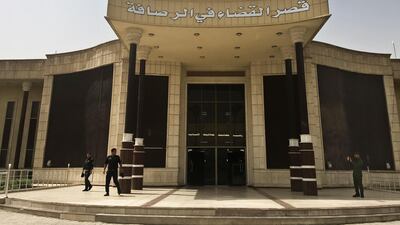On Sunday, an Iraqi court sentenced four French ISIS members to death. The men – who have 30 days to appeal against their conviction – were among 13 French nationals handed to the Iraqi authorities by the US-backed Syrian Democratic Forces earlier this year. They are also the first French citizens to receive death sentences for ISIS membership. However, there are thousands more awaiting trial. At the height of ISIS's brutal reign, more than 40,000 foreign fighters joined the group's ranks in Syria and Iraq. Now, in defeat, the fate of these foreign recruits is uncertain. As the ongoing civil war in Syria has made it impossible to try ISIS members there, the Iraqi government agreed to hold trials of these foreign fighters earlier this year. Iraq, however, remains a battle-scarred nation, and lacks the resources to effectively dispense justice to thousands of foreign militants. It has little choice, though, given that a number of western nations have either refused or exhibited extreme reluctance to address this problem.
As exhibited in the case of 19-year-old Shamima Begum and the British government, some countries have even attempted to strip ISIS sympathisers of their citizenship. This may, at first glance, seem like appropriately tough punishment, but it is also a way for nations to absolve themselves of any responsibility for extremists who were radicalised on their soil, then went on to spread terror overseas. France's position is that terrorists should be tried in the country where they committed their crimes. At the same time, along with nations such as Belgium and Russia, the French government is repatriating the young children of French ISIS parents. As these children would otherwise end up languishing in squalid Syrian displacement camps, this may seem a reasonable course of action. However, it also presents a serious ethical problem.
If nations are able to acknowledge their obligations towards innocent children, they cannot then ignore their responsibility towards their more morally compromised parents. Doing so has led to a situation in which Iraq is forced to mete out justice it is ill-equipped to provide, and where France has to simply accept its methods. This puts the French government in a tricky position. If – as it has so far – France chooses to stand by the verdict of the Iraqi courts, it will be accepting the death penalty, which is widely considered contrary to national values. The French Ministry of Foreign Affairs has already responded, stating it will "convey its position [against the death penalty] to the Iraq authorities". But what right does it have to do so when it refuses to take responsibility for the actions of its own citizens? These are thorny questions, and while international powers work out their answers, one thing is abundantly clear – Iraq cannot and should not shoulder this burden alone.

